
Kristi helps to plant an erosion barrier at an organic milpa farm. Image courtesy of Michelle Watts.
By Dr. Michelle Watts
Associate Dean, School of Security and Global Studies
with Dr. Kristi Drexler
Faculty Member, School of STEM
In late April, we presented our research on COVID-19 impacts to Indigenous communities at the 72nd Annual Meeting of the Southeastern Council of Latin American Studies (SECOLAS). This event took place at the Instituto Mora in Mexico City.
What Did We Discuss at the 2025 SECOLAS Conference?
During this 2025 SECOLAS conference, we presented as part of the panel called “Conflict & Care: The Public Sphere in Latin America,” along with other presenters from Duke University and SUNY-Albany.
Our presentation, “An Interdisciplinary Capitals Assessment of COVID-19 Pandemic Impacts to Indigenous Communities of the Americas,” reported preliminary findings for our study that is now in its fourth year. We discussed the challenges of Indigenous communities during the COVID-19 pandemic and how socio-cultural strengths helped communities get through the pandemic.
For example, many of our respondents reported a renewed interest in food sovereignty, as many community members returned to growing and processing their own food. In addition, many respondents reported a greater reliance on traditional medicines during the pandemic as a way to stay healthy, treat ailments and avoid hospitals.
The other 2025 SECOLAS conference panelists had a wide range of fascinating topics, all tied to health and well-being. One speaker discussed how sailors in Brazil historically had to fight to end horrendous work conditions that included flogging and what amounted to indentured servitude.
More closely related to our topic, a researcher recounted Mexico’s ill-timed effort to transform the Mexican health system. Dramatic changes occurred just before the onset of the pandemic, making access to healthcare more difficult during this precarious time.
Another presenter spoke about the church’s influence on women’s reproductive decisions historically. We had a small but enthusiastic audience, and we enjoyed exchanging ideas and input on each other’s projects.


Presenting our research at the 2025 SECOLAS conference. Images courtesy of Kristi Drexler and Michelle Watts.
Our study, supported by research grants from the University, has aided us in examining a variety of COVID-19 impacts to Indigenous communities ranging from Alaska to Belize. These grants have been instrumental in enabling us to travel to various areas in the Western Hemisphere and spend time with Indigenous communities to enrich our research.
The purpose of our study has been to give voice to how Indigenous communities experienced the COVID-19 pandemic, especially regarding how they coped, adapted and worked together. On these research trips, our researchers have looked at culture, economics, health, education, environment, governance, and other factors that may have influenced (or been influenced by) a community’s lived experiences during and after the pandemic.
To date, we’ve interviewed over 150 Indigenous community members and leaders.
International Presentations of Our Research
So far, we have presented the preliminary results of our COVID-19 research at three international conferences (including the 2025 SECOLAS conference):
- Presenting COVID-19 Field Research at the SECOLAS Conference, Southeastern Council of Latin American Studies, Antigua, Guatemala (April, 2023) and Mexico City, Mexico (April, 2025)
- Pandemic Research and Presenting at the LASA Conference, Latin American Studies Association, Bogotá, Colombia (June, 2024)
A Field Trip to Xochimilco
In addition to the conference, the student chapters of Women in STEM (wSTEM) and the Society for Advancement of Chicanos/Hispanics and Native Americans in Science (SACNAS), for which we are faculty advisors, supported a few field trips. One of the field trips led us to Xochimilco (“place of the flowers”), an ecological area of ancient canals and farmland about 28 kilometers (17 miles) to the south of Mexico City.
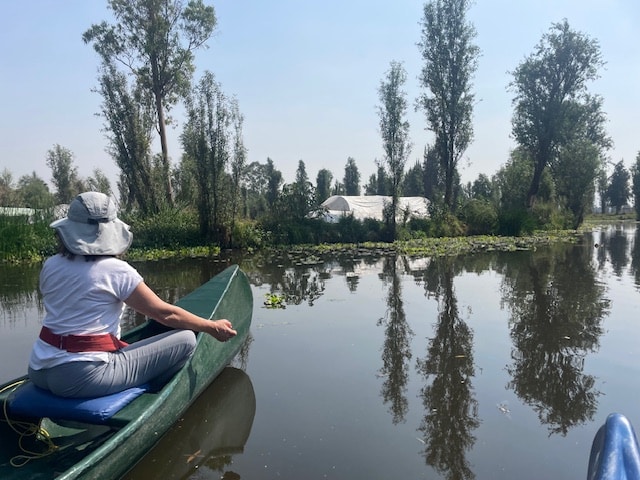
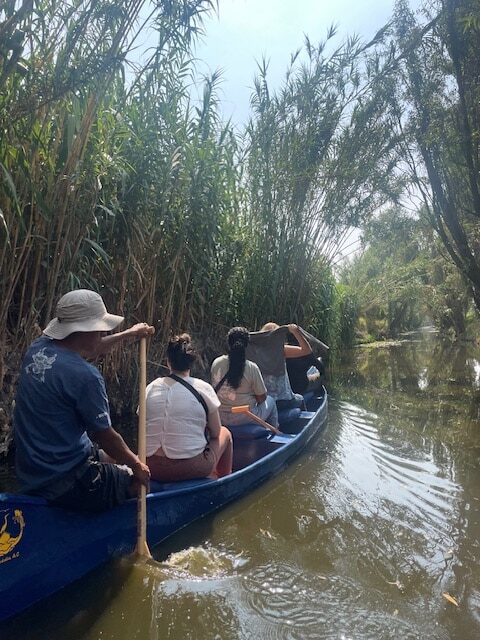
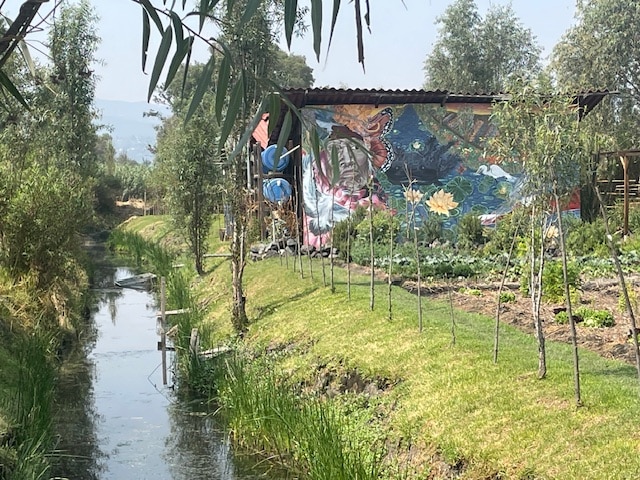
Canoeing at Xochimilco, ancient canals and farmland in Mexico City. Images courtesy of Kristi Drexler.
Our field trip was led by guides from Humedalia, A.C. This non-government group works to preserve Xochimilco’s wetlands and restore ancient agricultural practices.
Chinampas: Created by the Aztecs for Farming
At Xochimilco, there are approximately 170 kilometers (almost 106 miles) of canals that snake through the area. They are a part of human-made farm islands called “chinampas.”
Chinampas were constructed by the Aztecs prior to the arrival of the Spanish. Aztec farmers took advantage of the nutrient-dense mud to grow crops and feed the growing population.
While chinampas are widely known as “floating islands,” they are actually built from the ground up by piling vegetation on reed mats. According to our guide, many of the chinampas were inadvertently flooded by the Spanish, permanently destroying them.
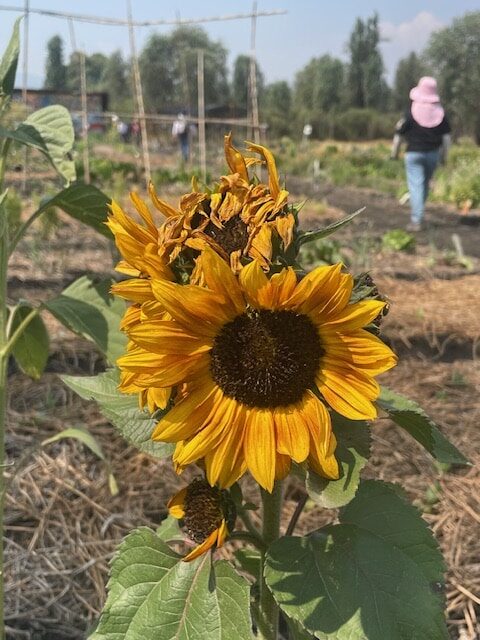
Our Xochimilco guides showed us their organic “chinampa.” Image courtesy of Kristi Drexler.
Conservation Efforts at Xochimilco
Our Humedalia guides at Xochimilco explained that only 2% of the original Great Mexico Lake – upon which Mexico City is built – is left. As a result, conservation is a priority in the area.
During our tour, we traveled by canoe through the canals. We spotted many birds along the way, including:
- Great egrets
- White-faced ibis
- Night herons
- Kingfishers
We also saw several anole lizards, fish and other aquatic species. Our guides explained how the introduction of carp and tilapia to the canals have jeopardized native species, especially the endemic and critically endangered Mexican axolotl, a large salamander.
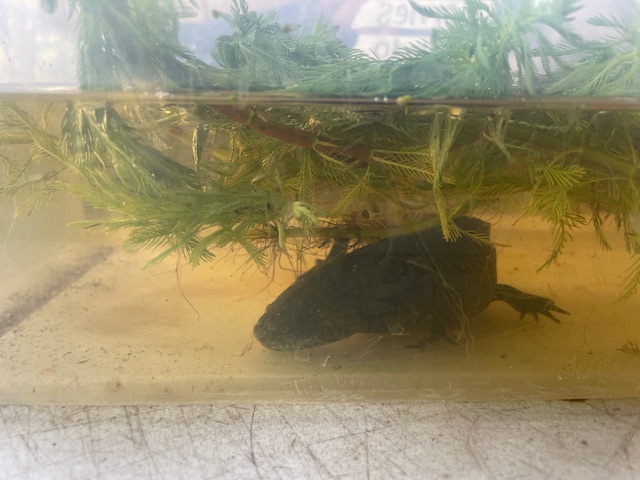

The farm’s local rescued axolotl “Martha”. Image courtesy of Michelle Watts. Image on the right is courtesy of a GlobalGiving axolotl conservation campaign.
This field trip was invaluable for learning not only about Aztec history, but the ecology of these fragile wetlands. While Xochimilco has formal protections as a part of a UNESCO World Heritage site with “outstanding universal value,” the enforcement of environmental protections is very challenging as the area attracts a multitude of locals and tourists each day.
For example, motors are banned on the canals, but we saw a motor-powered boat slide past our canoes while we rowed. In addition, cows are not allowed, but we saw dozens of black and white dairy cows on the chinampas. What is left of these wetlands is hard to maintain without binding regulations.
Going to a Milpa Farm
After arriving by canoe to an organic milpa farm, we had the opportunity to tour its gardens and learn about the milpa farming system. This type of farming system consists of planting compatible vegetation close together to better allow diverse crops and plants to thrive.
While at the farm, we transplanted baby beet seedlings in the garden and hope that they will thrive. Our hosts explained that they only use organic fertilizers and organic pesticides, comprised of natural repellants such as ground chili and marijuana. Kristi also helped plant tree saplings to help reinforce a natural fence and erosion barrier.
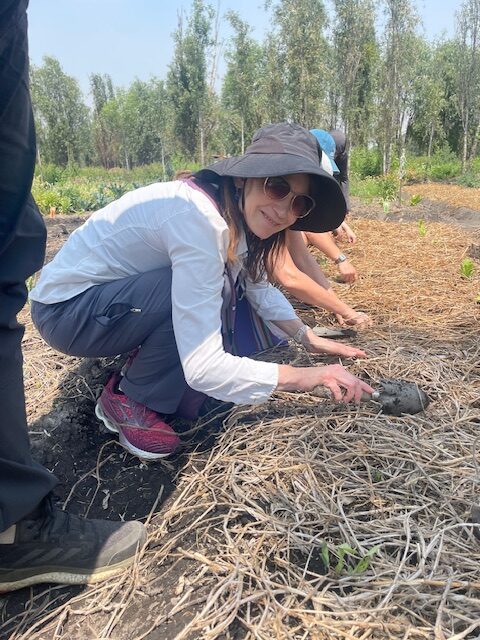
Michelle planting a beet seedling at the chinampa. Image courtesy of Kristi Drexler.
After our hard work, we were treated to a delicious lunch: a fresh salad and juice made completely from a variety of greens and vegetables from the garden. After lunch, our hosts educated us with a game of loteria (essentially a bingo game) that required us to identify objects and wildlife from the area. (Michelle won the loteria game!)
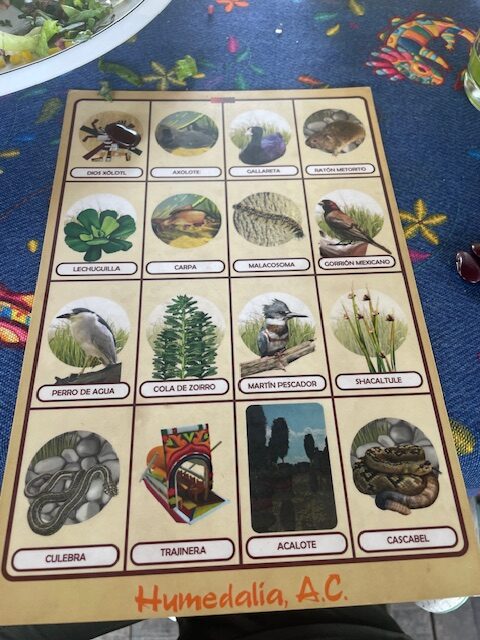
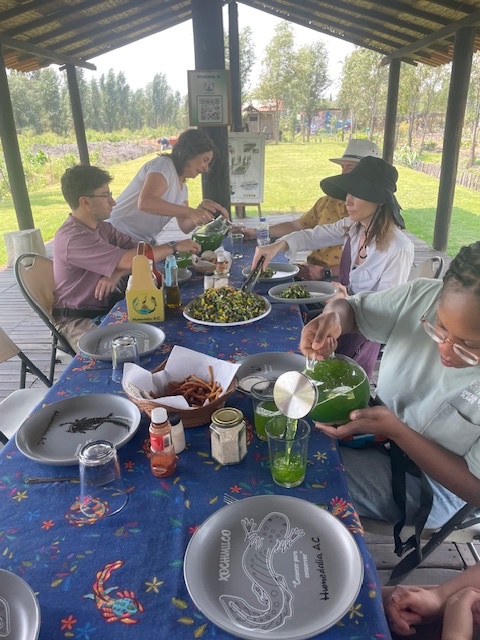
Playing ecology loteria and eating a healthy, delicious lunch from the garden. Images courtesy of Kristi Drexler.
Spotting ‘Trajinera’ Boats
Xochimilco is often associated with a popular form of canal transportation: the colorful Trajinera boat. Each boat has a unique name and design, and some are devoted to carrying mariachi bands and selling tacos to entertain those enjoying the canals. We had the good fortune of seeing this type of boat during our trip.
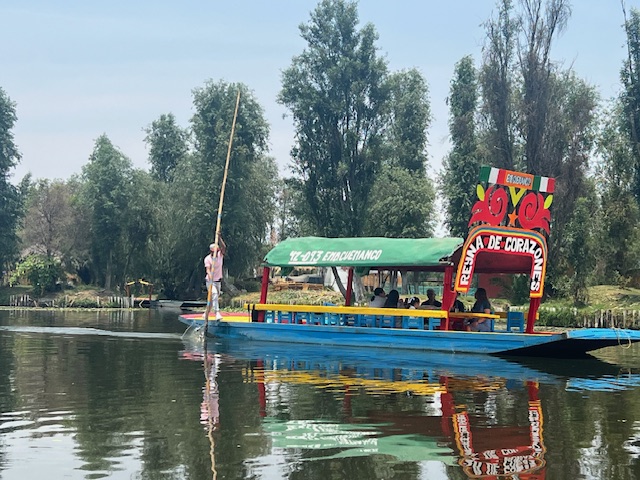
Propelled by poles though the shallow canals, many visit Xochimilco by “trajinera” boat. Image courtesy of Keith Watts.
Learn More about Our COVID-19 Research
Since 2022, we have traveled to several Indigenous communities in the U.S. and South America to study how they handled the various impacts of COVID-19:
- COVID-19 Research: Studying Its Impact on Native Communities, Taos Pueblo, New Mexico (May, 2022)
- COVID-19’s Impacts on Indigenous Communities in Alaska, Perryville, Alaska (June, 2022)
- Pandemic Impact Study to Continue in Alaska during August, (July, 2022)
- A COVID-19 Pandemic Study Continues in Southeast Alaska, Metlakatla Indian Community (August, 2022)
- Pandemic Study in Belize: Silverio Canto, Mayan Healer (April, 2023)
- Faculty Continue COVID-19 Research: Belize and Guatemala, a focus on San Antonio Village in Belize (March, 2023)
- Researching the COVID-19 Pandemic Experience in Guatemala, in two communities: Panajachel and San Jorge La Laguna villages at Lago Atitlan, Guatemala (April, 2023)
- Exploring the COVID-19 Pandemic and Its Aftermath in Belize, San Jose Succotz (November, 2023)
- Our COVID-19 Research Continues in Kodiak, Alaska: Part 1, Kodiak, Alaska (August, 2024)
- Our COVID-19 Research Continues in Kodiak, Alaska: Part 2, Kodiak, Alaska (August, 2024)
- Our Pandemic Study Continues in Acoma Pueblo, New Mexico (January, 2025)
Indigenous and Science-Based Organizations at the University
If you are a student, alumni, faculty member or staff at the University interested in joining a student organization, consider joining SACNAS. This organization promotes diversity in STEM in the contexts of social connections and a sense of belonging, academic development, and professional development.
Pedro Maldonado, the Vice President of SACNAS, Communications Officer for wSTEM and a current doctoral student at the University, says that SACNAS “works to achieve its mission by providing mentorship, professional development and leadership opportunities to its members. It would behoove SACNAS members to attend a SECOLAS conference. It would allow an opportunity to connect with other Chicanos, Hispanics and Native Americans.”
About the Authors
Dr. Michelle Watts is the Associate Dean of the Department of Security and Global Studies, where she also teaches in the doctoral program. She has a bachelor’s degree in international studies from American University, a master’s degree in Latin American studies from the University of Arizona and a Ph.D. in international development from the University of Southern Mississippi.
Dr. Watts has collaborated with colleagues on nine research grants encompassing a wide range of topics. Her work includes “Bomberos, Maestros y Psicólogos: Guatemalan Civil Society Response to the Volcano of Fire Disaster,”“Making Sovereignty Mean Something: Native Nations and Creative Adaptation,” “Drugs, Thugs, and the Diablos Rojos: Perils and Progress in Panama,” “Seguridad del Canal de Panamá: Una Década Después de la Salida de Estados Unidos” (Security of the Panama Canal: One Decade after U.S. Departure), and “Game of Norms: Panama, the International Community, and Indigenous Rights.” She is the principal investigator for the research study, “A Case Study Comparison of Pandemic Experience of Indigenous Groups in the Americas.”
Dr. Kristin Drexler is a full-time faculty member in the Space Studies and Earth Sciences Department. She teaches geography, environmental science, conservation of natural resources, earth and planetary sciences, and sustainability for the School of STEM.
Dr. Drexler holds a bachelor’s degree in journalism and mass communication from New Mexico State University and a master’s degree in Latin American studies with an emphasis in natural resources management from Ohio University. She earned her Ph.D. in educational leadership at New Mexico State University with research in socioecological systems, sustainable agroecology, and community education.
Dr. Drexler earned the Undergraduate Excellence in Teaching Award for the School of STEM (2020) and the Dr. Wallace E. Boston Leadership Award (2021). Dr. Drexler has conducted numerous community surveys in Belize and Guatemala regarding agroforestry, conservation, sustainable agriculture, and COVID-19 impacts and is a co-investigator for the multi-year research study, “A Case Study Comparison of Pandemic Experience of Indigenous Groups in the Americas.”
In the late 1990s, Dr. Drexler served as a Peace Corps volunteer in Belize; she co-founded Full Basket Belize, a 501(c)(3) and has served on its Board of Directors since 2005. Dr. Drexler produced the award-winning short film “Yochi” she also founded “Science Talks with Dr. Drexler and Friends” to assist teachers during the pandemic. Dr. Drexler also co-directs the Gila Film School and has produced seven documentary films sponsored by the U.S. Forest Service to celebrate the centennial of the Gila Wilderness this year. She also serves as a faculty advisor for the University’s wSTEM, AWIS and SACNAS chapters.